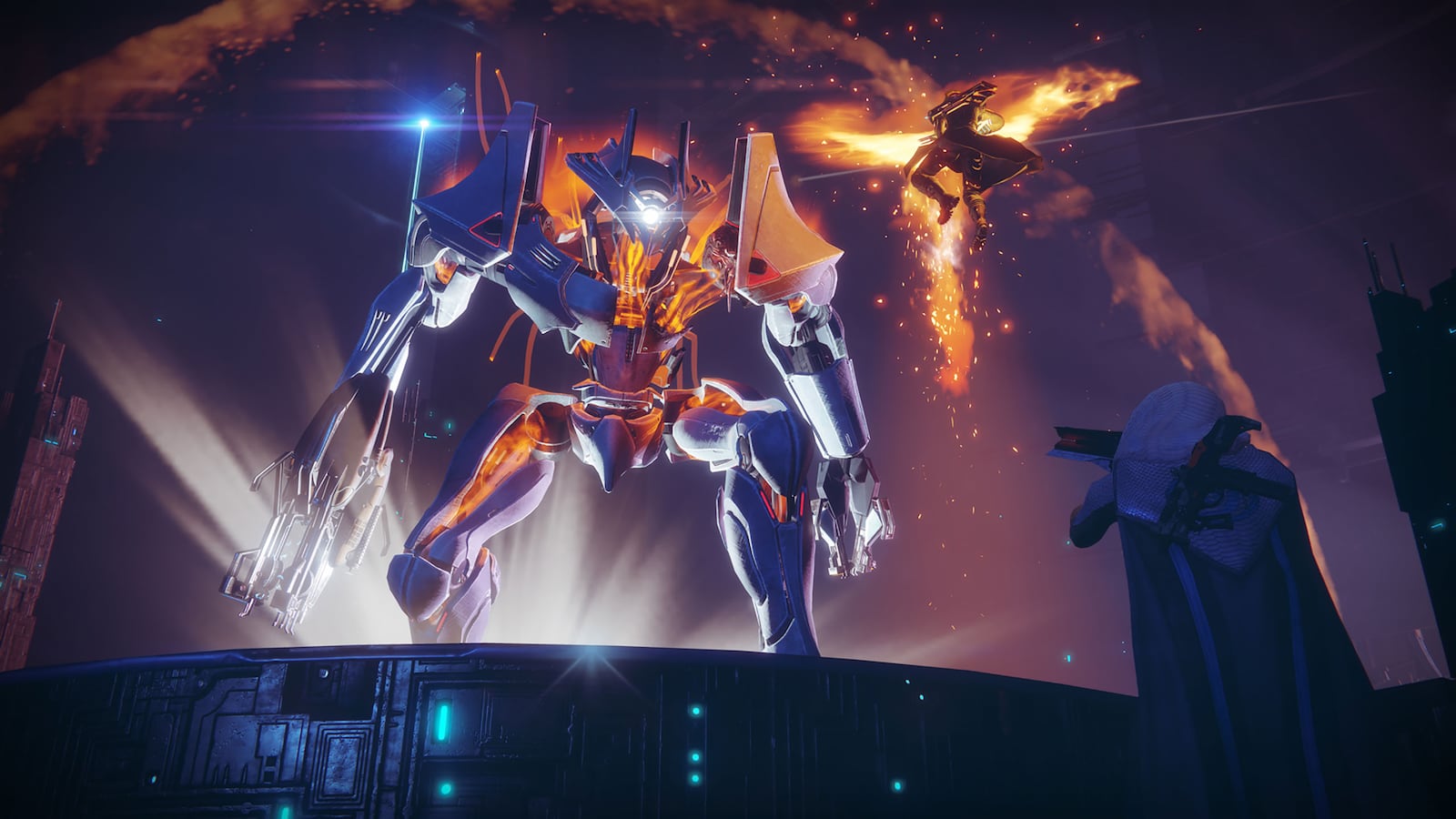Activision wants you to know that Destiny 2 is a big deal. The mega-publisher best known for Call of Duty wants you to know that they’ve put a lot of work and a lot of money into this game, and that this is going to be one of the biggest launches in the history of gaming. They want you to know this so badly that they flew hundreds of writers and YouTubers/Twitch streamers in from all over [disclosure: myself included] to witness the game’s official unveiling and tell you about it. The event, which took place in an airline hangar Thursday in Los Angeles, made an iPhone announcement look like a boardroom presentation.
The pomp and circumstance was, to be honest, a bit much. The rockstar lighting for the keynote speakers and museum-like aisles of weapon and armor replicas felt over-the-top. There is no other entertainment industry that puts on events like this, let alone for a single game. Admittedly, though, this game is going to sell like gangbusters.
So, what is Destiny 2? Think World of Warcraft by way of Halo and you’re in the ballpark. Like Halo, the franchise that made Destiny developer Bungie famous, it’s a sci-fi first-person shooter with a cartoony art style (you’d be forgiven for thinking it was a Halo sequel at first glance). And like WoW, it’s meant to be the only game you ever play. It’s supposed to wake you up in the morning and tuck you into bed at night. It is there in sickness and in health, to have and to hold. In exchange, you give it money and literal months of your life.
And it’s been extremely successful. In its first day, the original Destiny made half a billion dollars, and it only grew from there. Now in the third year of its life, there are still hundreds of thousands of people who log into Destiny on any given day, and that number can well exceed one million during the big public events that the game hosts.
“There are a lot of people for whom Destiny is their hobby,” said David Allen, the game’s executive producer, in an interview with The Daily Beast. “It’s the thing they do. It’s the place they hang out with their friends. After work, they go into the game and talk about how their day was and how life is going. We want to support that.”
It’s a little odd to think of a single piece of entertainment as a hobby, rather than the form of entertainment itself, but it gets at the heart of something interesting. There are people who have put more than one thousand hours into Destiny. If you do anything for a thousand hours, it transcends its own medium. For many of these people, it may be literally the only game they play. Are these people “gamers”? Not really. They don’t play games; they play Destiny. It’s become its own entity. “Our competition is literally anything you could be spending your free time on, whether that’s reading a book or whatever you like to do,” said Allen.
Destiny hasn’t been static all this time, of course. You can’t keep people coming back to an unchanging experience repeatedly for three years. There’s got to be a constant drip of new content, which is the MO of MMOs. This is why, thirteen years after release, there is still no World of Warcraft 2 (and there may never be). Instead, there have been six major expansion packs—one released every few years—with new content to entice players back into the original game, which would now be unrecognizable to someone who stopped playing years ago. Destiny itself has seen four expansion packs, two of serious substance. All of this begs the question: Why make a sequel at all?
The answer, it seems, is rather cynical: marketing. “One of the challenges when you’re making expansions to an existing game is that new players might just say, ‘Oh, I’ve already missed the first game and three expansions, so I’m gonna be way behind and it’ll be hard to catch up,’” said Allen. “We wanted everyone to have a chance to have a level playing field.”
By slapping a “2” on it instead of another subtitle, it’ll be much easier to get new players through the door. And it does seem that Allen and the rest of the team are proud of the game they have made and the work they’ve done to make it more accessible. The idea of accessibility came up several times during the keynote presentation, which largely focused on increased community tools the original game lacked. Supporting the hobby, as it were.
But as someone who never got through the first Destiny, I’m not so sure about this new narrative everyone seems so happy with. Creators went on and on about universal themes of loss and recovery, but the game’s introduction, a particularly bombastic series of firefight set pieces, was total sensory overload and context-less. Cheering crowds around me made it clear I was missing something, and the game didn’t seem interested in telling me what. Even when I got my hands on it and spent around 90 minutes playing the game over three different modes, I never really found it more than “fine.” I talked to other people at the event, members of the media and “fans” who were allowed into the event as well (in part, I imagine, to amplify the applause during the presentation). Some people felt the way I did, and others were extremely excited.
Destiny launched to fairly tepid reviews back in 2014, after being hyped for months and achieving a decent but not entirely compelling experience. Bungie took the feedback to heart and over the years has released updates that addressed many fan complaints. And so Destiny 2 starts off with a much more solid foundation—but critics may still find things to loathe.
But Destiny 2’s quality matters much less than its community. The community is the thing that will make or break the game, and I think we already know how that’s going to go: Each of the hundreds of thousands of people currently playing Destiny in the third year of its life are going to buy Destiny 2. All the people who put in hundreds of hours and then put the game down are going to buy Destiny 2. The marketing blitz that inevitably leads up to launch means a whole lot more will buy it as well. This game is going to be big, in large part because it isn’t just a game. It’s an entire system unto itself, a hobby and a form of entertainment all its own. It is the last game you will ever need to buy.
Until Destiny 3 comes out, anyway.






